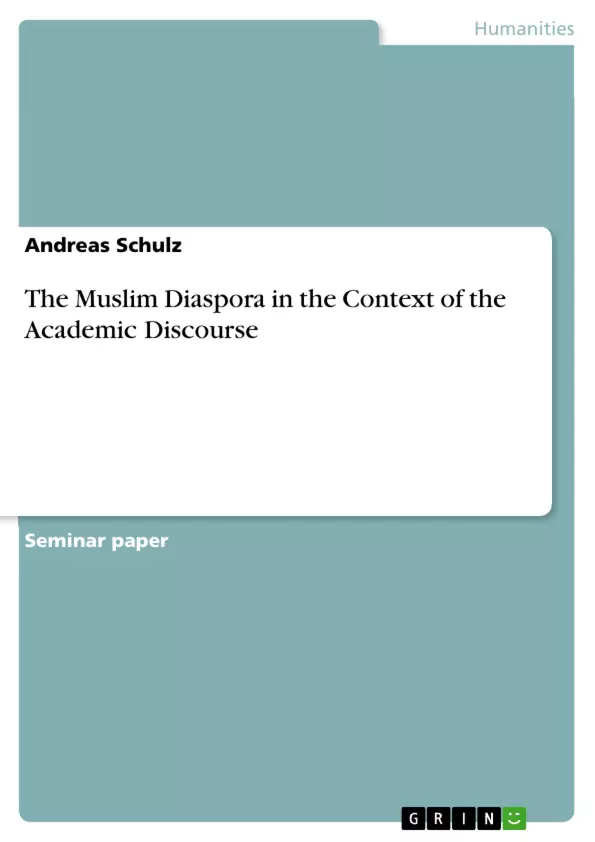In the following I will discuss some general conceptual thoughts on the notion of diaspora, which could be useful for the discussion of the claim of an existing Muslim Diaspora. After the introduction I'd like to illustrate with social-science based literature on Germany and the USA thoughts on The Muslim Diaspora. Referring to this chapter I'd like to present arguments for and against the usage of the notion The Muslim Diaspora in social sciences. A reflection will sum up the ideas of the essay.
Many especially western socialized scholars speak about the Muslim Diaspora in Europe and the USA. In fact that the notion of diaspora has been politicized, many nationalist groups or even governments often use the concept of diaspora to pursue agendas of nation-state-building or controlling populations abroad. Because of this politicization of the notion, “scholars have argued that the term should be used with care and not regarded as an innocuous analytical concept” (Brubaker 2005, quoted in Faist 2010: 13).
Looking at the EU and the debate on a European comprehensive immigration policy, the term diaspora figures prominently in officially issued EU documents and that the concept has evolved along with efforts at migration control. In EU documents, “Diasporas are portrayed as networks of migrants with various legal links to the home country. By contrast, the language of UN documents revolves around ‘transnational communities’ as main actors in development policy.” (Faist 2010: 19) But in the terms of the EU, Diasporas, as proverbial “seeds in the wind”, “are thought to contribute to development in the countries of origin, without being burdened by the experience of traumatic dispersal.” (ibid. 19)
In general, concepts of diaspora deal with dispersal, traumatic and the resulting emergence and reproduction of collective identity (varying intensities of ties to the country of emigration and the countries of immigration) (ibid. 21). It is important to notice that the concept and the meanings of the notion ‘diaspora’ changed dramatically in the academia (and even the politics) in the last decades. If the academia would argue, that the three main categories of the concept of diaspora are (1) the dispersion in space (2) the orientation to a homeland and (3) boundary maintenance - it could be possible to converge to the phenomenon of diaspora and to draw near the discussion if there is the Muslim diaspora in the western world and the following discussion question:
Inhaltsverzeichnis (Table of Contents)
- Introduction
- Theoretical Thoughts on Diaspora
- The Muslim Diaspora
- Arguments for and against the usage of the notion The Muslim Diaspora
- Conclusion
Zielsetzung und Themenschwerpunkte (Objectives and Key Themes)
This paper aims to explore the complex concept of "Muslim Diaspora" within academic discourses, particularly considering the historical evolution and ongoing debates surrounding its application. It examines the validity of the term and its implications for understanding Muslim communities in Western societies.
- The changing meaning and application of the term "diaspora" in academic literature and political discourse.
- The politicization of the concept of diaspora and its potential impact on nation-state building and migration control.
- The relationship between religion, ethnicity, and identity in shaping the experiences and perceptions of Muslim communities.
- The challenges of applying the concept of diaspora to diverse Muslim populations across different countries and contexts.
- The ongoing debate about the existence of a single "Muslim Diaspora" versus the possibility of multiple, distinct diasporas.
Zusammenfassung der Kapitel (Chapter Summaries)
- Introduction: This chapter introduces the central question of whether a "Muslim Diaspora" exists and explores the problematic nature of applying a monolithic term to such a diverse and multifaceted group. It highlights the politicization of the concept and its use in both academic and political contexts.
- Theoretical Thoughts on Diaspora: This chapter delves into the evolution of the diaspora concept, highlighting its expansion in meaning and application across various disciplines. It examines the classical understanding of diaspora, its adaptation to contemporary migration patterns, and the challenges associated with applying the term in the age of globalization.
- The Muslim Diaspora: This chapter focuses on arguments for and against using the term "Muslim Diaspora" to describe Muslim communities in Western societies. It explores the potential benefits and limitations of such a categorization and considers alternative approaches to understanding Muslim experiences in these contexts.
Schlüsselwörter (Keywords)
This paper focuses on the key terms and concepts surrounding the Muslim Diaspora, including diaspora studies, transnationalism, Muslim identity, Islam, migration, globalization, and the politics of identity. It examines the theoretical debates and empirical evidence surrounding the use of the term "Muslim Diaspora" to understand Muslim communities in Western societies.
Frequently Asked Questions about the Muslim Diaspora
What is meant by the term 'Muslim Diaspora'?
It refers to the global dispersal of Muslim populations and the resulting collective identity and ties to their countries of origin.
Why is the term 'diaspora' considered controversial in social sciences?
The concept has been politicized by governments and nationalist groups to pursue agendas like nation-state building or controlling populations abroad.
What are the three main categories of the diaspora concept?
Scholars identify (1) dispersion in space, (2) orientation to a homeland, and (3) boundary maintenance as the core elements.
How does the European Union (EU) define diasporas?
The EU views diasporas as networks of migrants with legal links to their home countries who can contribute to development policy.
Is there a single 'Muslim Diaspora' in the West?
The essay discusses arguments for and against a monolithic term, considering the vast diversity within Muslim communities in Germany and the USA.
- Quote paper
- Andreas Schulz (Author), 2016, The Muslim Diaspora in the Context of the Academic Discourse, Munich, GRIN Verlag, https://www.grin.com/document/319993



